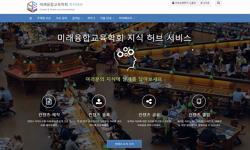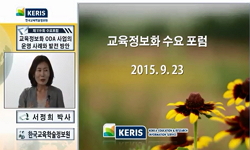The purpose of this study is to explore the contexts and characteristics of Korea’s support for its Knowledge Sharing Program (KSP), especially the Policy Consultation. Specifically, it analyzes the correlations among the factors influencing the all...
http://chineseinput.net/에서 pinyin(병음)방식으로 중국어를 변환할 수 있습니다.
변환된 중국어를 복사하여 사용하시면 됩니다.
- 中文 을 입력하시려면 zhongwen을 입력하시고 space를누르시면됩니다.
- 北京 을 입력하시려면 beijing을 입력하시고 space를 누르시면 됩니다.
https://www.riss.kr/link?id=T14739971
- 저자
-
발행사항
서울 : 연세대학교 행정대학원, 2018
-
학위논문사항
학위논문(석사) -- 연세대학교 행정대학원 , 공공정책 전공 , 2018.2
-
발행연도
2018
-
작성언어
한국어
- 주제어
-
발행국(도시)
서울
-
기타서명
Analysis of support for knowledge sharing program(KSP) : focused on factors influencing the allocation of financial resources to policy consultation
-
형태사항
vi, 60 p. : 삽화(일부천연색) ; 26 cm
-
일반주기명
지도교수: 정헌주
-
UCI식별코드
I804:11046-000000516031
- 소장기관
-
0
상세조회 -
0
다운로드
부가정보
다국어 초록 (Multilingual Abstract)
Unlike the conventional unilateral material assistance transferred by donors to recipients, the KSP is well-received by international aid communities as the contents fitting the knowledge sharing and valuing the bilateral exchange between donors and recipients. Notably, Korea has been advocated by international aid communities as the best practice of transforming itself into a donor from a recipient, being equipped with tangible comparative advantages in comparison to other advanced countries that have never been recipients of aids, and being willing to share its development-related experience and knowledge with recipients.
Despite its substantiality, the KSP has not been well-documented due to the short history of its implementation, with relevant research limited to collective data analyses or policy suggestions.
Hence, this study sheds light on the fact that the support fund for the Policy Consultation for 43 countries from 2004 to 2013 has substantially increased since Korea joined the DAC in 2010, and particularly homed in on Asia, industrial policies and economic development plans. Also, it may be inferred that following the increase in support fund, the Policy Consultation has been characterized by the strategies for seeking new recipient countries rather than staying focused on existing recipients.
In addition, to explore the factors influencing the allocation of financial resources to the Policy Consultation, this study sets up independent variables using the DI(Donor Interest)-RN(Recipient Needs) model, which was used to analyze the allocation of financial resources to the ODA.
In terms of DI, this study analyzes the statistical significance of the variables, i.e. the volume of trade with partners, amount of direct investment in partners, summit talks with partners and cumulative lengths of established diplomatic relations with partners. In view of RN, partner countries’ per capita GDP, LDCs and political stability of partner governments are analyzed as variables.
The analysis of the correlation between variables indicates a notable correlation between the support fund for the Policy Consultation and the summit talks. Also, the amount of direct investment and per capita GDP have significant correlations with the support fund for the Policy Consultation.
The T-test illuminates the statistical significance of the increase in support for the Policy Consultation in proportion to the volume of trade with and the direct investment in partners from the perspective of DI. Also, the summit talks are statistically significant. From the perspective of RN, the smaller the per capita GDP of a partner country, the greater the allocation of financial resources to the Policy Consultation, which is statistically significant.
The limited data precludes any empirical analysis of the effects among variables. Still, this study should be noted in that it takes the first feasible approach to the factors influencing the allocation of financial resources to the KSP.
This study will lay the foundation for further discussions concerning the allocation of financial resources to the KSP and serve as some reference data conducive to further studies on diverse options for economic cooperation linked to the ODA of Korea.
The purpose of this study is to explore the contexts and characteristics of Korea’s support for its Knowledge Sharing Program (KSP), especially the Policy Consultation. Specifically, it analyzes the correlations among the factors influencing the allocation of financial resources to the Policy Consultation and determines their statistical significance using the T-test.
Unlike the conventional unilateral material assistance transferred by donors to recipients, the KSP is well-received by international aid communities as the contents fitting the knowledge sharing and valuing the bilateral exchange between donors and recipients. Notably, Korea has been advocated by international aid communities as the best practice of transforming itself into a donor from a recipient, being equipped with tangible comparative advantages in comparison to other advanced countries that have never been recipients of aids, and being willing to share its development-related experience and knowledge with recipients.
Despite its substantiality, the KSP has not been well-documented due to the short history of its implementation, with relevant research limited to collective data analyses or policy suggestions.
Hence, this study sheds light on the fact that the support fund for the Policy Consultation for 43 countries from 2004 to 2013 has substantially increased since Korea joined the DAC in 2010, and particularly homed in on Asia, industrial policies and economic development plans. Also, it may be inferred that following the increase in support fund, the Policy Consultation has been characterized by the strategies for seeking new recipient countries rather than staying focused on existing recipients.
In addition, to explore the factors influencing the allocation of financial resources to the Policy Consultation, this study sets up independent variables using the DI(Donor Interest)-RN(Recipient Needs) model, which was used to analyze the allocation of financial resources to the ODA.
In terms of DI, this study analyzes the statistical significance of the variables, i.e. the volume of trade with partners, amount of direct investment in partners, summit talks with partners and cumulative lengths of established diplomatic relations with partners. In view of RN, partner countries’ per capita GDP, LDCs and political stability of partner governments are analyzed as variables.
The analysis of the correlation between variables indicates a notable correlation between the support fund for the Policy Consultation and the summit talks. Also, the amount of direct investment and per capita GDP have significant correlations with the support fund for the Policy Consultation.
The T-test illuminates the statistical significance of the increase in support for the Policy Consultation in proportion to the volume of trade with and the direct investment in partners from the perspective of DI. Also, the summit talks are statistically significant. From the perspective of RN, the smaller the per capita GDP of a partner country, the greater the allocation of financial resources to the Policy Consultation, which is statistically significant.
The limited data precludes any empirical analysis of the effects among variables. Still, this study should be noted in that it takes the first feasible approach to the factors influencing the allocation of financial resources to the KSP.
This study will lay the foundation for further discussions concerning the allocation of financial resources to the KSP and serve as some reference data conducive to further studies on diverse options for economic cooperation linked to the ODA of Korea.
국문 초록 (Abstract)
KSP는 공여국으로부터 수원국으로 이전되는 기존의 일방적 물질적 원조와 달리 최근 국제원조사회에서 각광받는 공여국과 수원국간 쌍방향 교류를 중시하는 지식공유에 부합하는 컨텐츠이다. 특히 우리나라는 수원국에서 공여국으로 전환한 국제원조사회의 모범사례(best practice)로서 원조 수혜 경험이 없는 다른 원조선진국들과 비교할 때, 실질적인 비교우위를 가지고 수원국과 개발경험 지식을 공유할 수 있는 경우이다.
이와 같은 중요성에도 불구하고 KSP에 관한 학술적 연구는 짧은 시행역사 등으로 제한적이었으며, 지금까지의 연구들도 집합적 자료 분석 또는 정책적 제언에 그치고 있다.
본 연구는 2004년부터 2013년까지 총 43개국에 지원된 정책자문사업이 2010년 DAC 가입 후 지원금액이 큰 폭으로 증가하였고, 특히 아시아 지역과 산업정책 및 경제개발계획 분야에 집중되어 있다는 것을 밝혀냈다. 또한, 정책자문사업 지원금액이 늘어났을 때, 정책자문사업의 특성상 기존 지원대상국에 대한 중점 지원보다는 신규 지원국가 발굴 전략을 취한 것으로 유추해 볼 수 있었다.
한편, 정책자문사업 재원 배분의 영향요인을 살펴보기 위해서 기존 ODA 재원배분 분석에 사용된 공여국의 이해(DI) - 수원국의 필요(RN) 모형을 활용하여 독립변수들을 설정하였다.
DI 관점에서는 협력대상국과의 교역규모, 협력대상국에 대한 직접투자액, 협력대상국과의 정상회담 여부, 외교 수립 누적기간을 변수로 통계적 유의성을 가지는지를 분석하였으며, RN 관점에서는 협력대상국의 1인당 GDP, LDCs 해당여부, 협력대상국 정부의 정치적 안정성 요인을 변수로 분석해보았다.
변수간 상관관계 분석 결과, 정책자문사업 지원액에 대하여서는 정상회담 개최여부가 높은 상관관계를 보였으며, 이외에도 직접투자액, 1인당 GDP가 유의미한 상관관계를 보이고 있음을 알 수 있었다.
또한 T-test를 통해서는 DI 관점에서 협력대상국과의 교역규모와 직접투자액이 클수록 정책자문사업의 지원이 많을 수 있다는 통계적 유의미한 결과를 보였으며, 정상회담 개최 유무 여부도 통계적 유의성을 가지고 있는 것으로 나타났다. RN 관점에서는 협력대상국의 1인당 GDP 수준이 낮을수록 정책자문사업의 재원배분이 많을 가능성이 높다는 통계적 유의미한 결과를 보이는 것으로 나타났다.
본 연구는 데이터의 제한으로 변수들간 영향 관계를 고려한 실증적 분석이 불가하였다는 한계가 있음에도 불구하고, KSP 재원배분에 영향을 끼치는 요인에 최초로 구체적 접근을 시도하였다는데 그 의미가 있을 것이다.
이러한 분석을 통하여 KSP 재원배분 정책과 후속 논의를 위한 기초를 마련함과 동시에 나아가서는 우리나라 ODA와 연계 방안 등 다양한 경제협력의 관점에서 후속 연구의 기초를 제공할 수 있을 것이다.
본 연구는 우리나라의 경제발전경험 공유사업(Knowledge Sharing Program, KSP) 중 정책자문사업을 중심으로 지원 현황 및 특성에 대하여 살펴보고자 하였다. 특히, 정책자문사업 재원 배분에 영향을...
본 연구는 우리나라의 경제발전경험 공유사업(Knowledge Sharing Program, KSP) 중 정책자문사업을 중심으로 지원 현황 및 특성에 대하여 살펴보고자 하였다. 특히, 정책자문사업 재원 배분에 영향을 끼칠 수 있는 요인들간 상관관계 분석 및 T-test를 실시하여 집단간 통계적 유의성 여부를 밝히고자 하였다.
KSP는 공여국으로부터 수원국으로 이전되는 기존의 일방적 물질적 원조와 달리 최근 국제원조사회에서 각광받는 공여국과 수원국간 쌍방향 교류를 중시하는 지식공유에 부합하는 컨텐츠이다. 특히 우리나라는 수원국에서 공여국으로 전환한 국제원조사회의 모범사례(best practice)로서 원조 수혜 경험이 없는 다른 원조선진국들과 비교할 때, 실질적인 비교우위를 가지고 수원국과 개발경험 지식을 공유할 수 있는 경우이다.
이와 같은 중요성에도 불구하고 KSP에 관한 학술적 연구는 짧은 시행역사 등으로 제한적이었으며, 지금까지의 연구들도 집합적 자료 분석 또는 정책적 제언에 그치고 있다.
본 연구는 2004년부터 2013년까지 총 43개국에 지원된 정책자문사업이 2010년 DAC 가입 후 지원금액이 큰 폭으로 증가하였고, 특히 아시아 지역과 산업정책 및 경제개발계획 분야에 집중되어 있다는 것을 밝혀냈다. 또한, 정책자문사업 지원금액이 늘어났을 때, 정책자문사업의 특성상 기존 지원대상국에 대한 중점 지원보다는 신규 지원국가 발굴 전략을 취한 것으로 유추해 볼 수 있었다.
한편, 정책자문사업 재원 배분의 영향요인을 살펴보기 위해서 기존 ODA 재원배분 분석에 사용된 공여국의 이해(DI) - 수원국의 필요(RN) 모형을 활용하여 독립변수들을 설정하였다.
DI 관점에서는 협력대상국과의 교역규모, 협력대상국에 대한 직접투자액, 협력대상국과의 정상회담 여부, 외교 수립 누적기간을 변수로 통계적 유의성을 가지는지를 분석하였으며, RN 관점에서는 협력대상국의 1인당 GDP, LDCs 해당여부, 협력대상국 정부의 정치적 안정성 요인을 변수로 분석해보았다.
변수간 상관관계 분석 결과, 정책자문사업 지원액에 대하여서는 정상회담 개최여부가 높은 상관관계를 보였으며, 이외에도 직접투자액, 1인당 GDP가 유의미한 상관관계를 보이고 있음을 알 수 있었다.
또한 T-test를 통해서는 DI 관점에서 협력대상국과의 교역규모와 직접투자액이 클수록 정책자문사업의 지원이 많을 수 있다는 통계적 유의미한 결과를 보였으며, 정상회담 개최 유무 여부도 통계적 유의성을 가지고 있는 것으로 나타났다. RN 관점에서는 협력대상국의 1인당 GDP 수준이 낮을수록 정책자문사업의 재원배분이 많을 가능성이 높다는 통계적 유의미한 결과를 보이는 것으로 나타났다.
본 연구는 데이터의 제한으로 변수들간 영향 관계를 고려한 실증적 분석이 불가하였다는 한계가 있음에도 불구하고, KSP 재원배분에 영향을 끼치는 요인에 최초로 구체적 접근을 시도하였다는데 그 의미가 있을 것이다.
이러한 분석을 통하여 KSP 재원배분 정책과 후속 논의를 위한 기초를 마련함과 동시에 나아가서는 우리나라 ODA와 연계 방안 등 다양한 경제협력의 관점에서 후속 연구의 기초를 제공할 수 있을 것이다.












